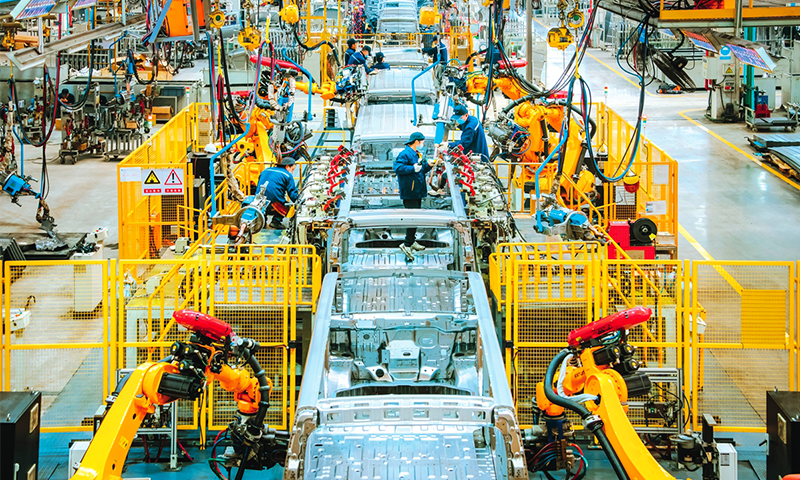'Price war' continues among Chinese NEV makers as 2024 key to define players' future: analysts

The "price war" among automakers in China that started in early 2023 has shown no signs of abating. Particularly in the new-energy vehicle (NEV) sector, both traditional and emerging players keep cutting prices or launching limited-time promotions, tactics that analysts anticipate will persist throughout the year.
XPeng Motors, one of the smart EV startups, announced on Sunday that all models of its G6 series will be discounted by 20,000 yuan ($2,779) until March 31, with prices starting at 189,900 yuan after the discount.
Huawei-backed AITO on Saturday launched limited-time promotions for its M5 series. On Friday, nine carmakers, including Geely, SAIC Volkswagen, Rising Auto and Chery, announced price reductions or limited-time promotions.
Auto giant BYD fired the first shot in this round of the "price war" after the Spring Festival holidays, introducing new versions of two models that are 20,000 yuan cheaper than the previous versions. US-based Tesla followed suit by launching limited-time discounts of up to 34,600 yuan for buyers.
The recent "price war" in the passenger vehicle market is fundamentally driven by the replacement of old technologies with new ones, and the transition from traditional fuel vehicles to NEVs, Cui Dongshu, secretary-general of the China Passenger Car Association, told the Global Times on Sunday.
"As a new market order emerges, intense competition between old and new manufacturers ensues, and this process is expected to persist for several years until a new industry landscape takes shape," Cui said.
In the rapid growth expected in the coming years, 2024 is expected to be a pivotal year for NEV producers to establish a solid footing in the market, Cui said.
China's NEV industry started early and has developed rapidly. With more than 100 manufacturers in the market, the competition is fierce. Top players are leveraging "price wars" to squeeze out smaller firms with limited innovation and funding, Zhang Xiang, director of the Digital Automotive International Cooperation Research Center of the World Digital Economy Forum, told the Global Times on Sunday.
The "price war" will persist throughout the year, Zhang said, noting that 2024 will be very significant for the players as governments at all levels roll out policies to promote vehicle consumption.
During the tone-setting Central Economic Work Conference held in Beijing in December 2023, Chinese leaders stressed that consumption of products, including NEVs and electronic products, should be stimulated.
In January, domestic NEV sales reached 1.06 million, accounting for 66 percent of the global market share, data from the CPCA showed.
"Price competition in the electric vehicle sector reflects a fully competitive market, offering consumers better deals and serving as a key competitive advantage for China's electric vehicles in the global market," Cui said.
NEV exports also performed strongly in January, particularly in Southeast Asian and European markets, which reflected the strength of China's industry chain and produced growth in both the domestic market and exports, Cui noted.
In 2023, China's vehicle production reached 30.16 million, up 11.6 percent year-on-year, while sales hit 30.09 million, up 12 percent. Both output and sales set new records, ranking first in the world for 15 consecutive years, data from the China Association of Automobile Manufacturers showed.